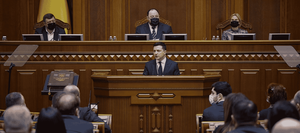The Briefing: The war in Ukraine slows down.
- The state of play
- Russia is narrowing its objectives in Ukraine
- It has withdrawn northern forces and redeployed them to the separatist Donbas region in the East
- Despite early success in the Donbas, Russian forces now seem stalled
- Some experts say the war could become a "frozen conflict"---neither side progressing or conceding
- Some useful numbers
- 671: Russian tanks lost in Ukraine, according to one source
- Over 3,000: Other Russian armored vehicles lost
- 163: Ukrainian tanks lost
- 400: Russian troops killed in a recent Ukrainian artillery attack (approximate)
- $40 billion: Aid Congress is preparing to send to Ukraine ( over half is military-related)
- How do we explain it?
- Few expected that the Ukraine would be such formidable defenders
- Explanations vary from sheer bravery to bad Russian strategy and extraordinary Western military assistance
- Another explanation could be corruption in the Russian security sector
The Big Question: Does corruption explain Russia’s struggles?
It’s important to note that what’s being asked here is if, all else being equal, corruption in the military makes a country less likely to win a war. There are so many factors in play in any given conflict that identifying some single decisive element in a country’s victory or defeat is basically preposterous. Neither corruption nor anything else tells the whole story.
Whether or not it explains their setbacks, Russia’s security sector is indeed corrupt. Russia is a kleptocracy, a kind of authoritarian regime structured around the flow of wealth and resources to the very top of the political hierarchy (making the necessary stops along the way, of course). Think of a very simple mafia structure in which bribery is endemic and everyone takes a cut of everyone below them, with the Don at the top collecting the most. Being a kleptocracy, as one report on corruption in the defense sector puts it, “corruption is not a ‘problem’ within the system. It is the system.”
Examples within the military are abundant. Fake or inexperienced contractors have been involved in supplying food and water to troops, and money has sunk into “research and development” projects that often involve neither research nor development. It’s been widely reported that Russian soldiers in Ukraine have found themselves short on gas and fuel, possibly because of corruption in the energy sector. Such shortages could help explain the sluggish pace of various Russian advances in Ukraine.
That said, many others have already pointed to corruption as the source of Russia’s strategic woes. However, most tend to ignore the other side of the equation—Ukraine. As we’ve written previously, Ukraine, like Russia, faces serious challenges when it comes to corruption. The political system is dominated by oligarchs, and after Russia’s illegal annexation of Crimea in 2014, a number of reports suggested that corruption in the Ukrainian security sector was to blame for its incompetent defense.
Given that, it’s appropriate to rephrase our question. Why has corruption apparently hindered Russia’s military efforts but not Ukraine’s?
The Theory: Democracy, Authoritarianism, and Corruption.
Corruption thrives in an environment of impunity. That is, it flourishes when those involved in it understand (or at least believe) that they are unlikely to face accountability. The question, then, is how such an environment of impunity comes into existence.
A survey of 173 countries by a group of political scientists points in the direction of an answer. They found that the institutions of healthy democracies have a significant effect in suppressing corruption. While obviously authoritarian regimes did much worse than thriving democracies, even worse were young or partially democratic regimes. Those regimes enjoy some of the openness of democracies, in the form of competitive elections as well as freedoms of speech and association. As it turns out, however, political candidates are easily bought in the absence of firm regulation, and weak judicial systems get in the way of accountability. Rights to expression and assembly can also contribute to corruption by providing corrupt actors opportunities to coordinate in ways not possible under consolidated autocracies.
Another study examining the relationship between democracy and corruption similarly finds that democracies provide opportunities to push corrupt officials out of office in free and fair elections. While corruption can take place in a democratic system, it’s possible to hold corrupt officials accountable through elections. Since regular elections pose a threat to corrupt actors, the incentives to engage in corruption would theoretically go down.
The Takeaway: Divergent outcomes.
In the 1990s, both Ukraine and Russia were partially democratic post-Communist countries, and both were highly corrupt. Over the course of the past two decades, though, their institutions diverged. Russia is an increasingly consolidated kleptocratic autocracy under the rule of a single individual. While it has seen some decline in clientelism and public sector corruption (as the article above would predict), it lacks the accountability mechanisms that would prevent the major inefficiencies we’ve seen in its military operations.
Ukraine—while by no means democratic—has enjoyed regular shifts in political power by means of free and fair elections (in addition to the occasional street revolution). Indeed, widespread dissatisfaction with corruption was the driving cause of current president Volodymyr Zelenskyy’s election in 2019. Zelenskyy himself is an imperfect champion of the anti-corruption movement, but as the political scientists Louis-Alexandre Berg and Andrew Radin note, his government enacted a number of anti-corruption reforms in the Ukrainian defense sector. In doing so, they have likely reduced certain inefficiencies that would otherwise have hampered the Ukrainian military’s capacity in its conflict with Russia.
These subtle changes in the quality of Ukrainian democracy should neither be thought of as the wholesale elimination of corruption or the most important factor in Ukraine’s largely successful defense. On the other side of the balance sheet, corruption-induced inefficiencies alone are hardly responsible for Russia’s poor performance, though it seems a fairly clear proof that democracies tend to have at least that advantage in times of war/conflict.
Subscribe to Spectacles

Comments
Join the conversation